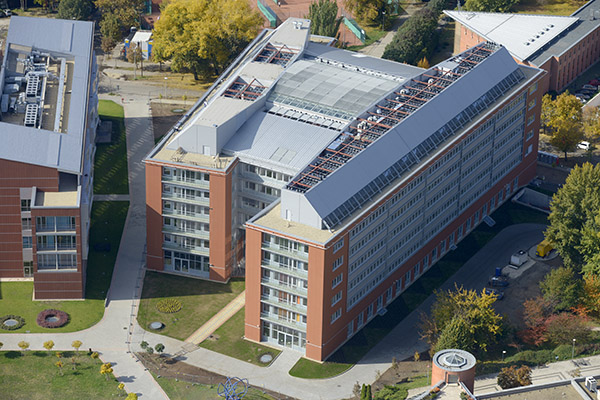The second peak of the COVID-19 pandemic is hitting Hungary. While it seems more severe than the first peak, it mainly affects young adults to date. To delay or completely avoid spreading the virus in RCNS, I hereby complement the safety regulations published on May 21.
Remote work remains supported as long as research group leaders give consent to their subordinates on an individual basis after discussion with the director of the corresponding institute. For non-researchers, consent is given by the head of the corresponding unit after discussion with the chief financial officer and the acting director. Remote work ensures that labs and offices work with minimal staff and particularly favors employees with children and those with increased exposure to health hazards.
Those who are above 60, live with a chronic condition, or are pregnant are advised to work from home.
Guests and those who deliver packages and goods are allowed to enter the building as long as they wear a face mask and disinfect their hands upon arrival.
Research subjects can be recruited and are allowed to enter the building without any restrictions on age. To protect the health of employees and research subjects, RCNS will develop a regulation for such cases.
International travel, either for business or private purposes, is not recommended. In case of an urgent international journey, the case should be reported to the director of the corresponding institute or the acting director. Upon arrival, complying with the existing legislation is mandatory.
Safety regulations in RCNS
Prior safety measurements have been complemented. Everybody must adhere to the following conditions.
Signs of COVID-19 infection: Anyone having a fever or observing signs of a COVID-19 infection must stay at home, inform their research group leader, and call their GP. Group leaders are asked to immediately report the case to their director and the human resources department. If symptoms are developing while working in RCNS, please immediately put on a face mask and go home.
IMPORTANT. Those who have had a contact with an individual showing signs of the COVID-19 infection yet not diagnosed with the virus, are not considered as close contacts and must adhere to the rules issued by the research group leader. Yet these colleagues must devote special attention to putting on a face mask and keeping an appropriate distance from their colleagues. In case of a contact with an individual diagnosed with COVID-19, the close contact definition applies.
Close contact definition: For COVID-19, a close contact is defined as any individual who, in a closed space (e.g. shared microscope or data analysis) and without wearing a face mask, was within 1 m of an infected person for at least 15 minutes starting from 3-5 days before positive specimen collection. Alternatively, a close contact may spend more than an hour in a small, closed room with the above-mentioned COVID-19 patient.
Individuals that fall under the definition of close contact, must put on a mask and immediately go home. They will be approached by the authorities and put in quarantine for 14 days. In case the authorities fail to take this step (which is likely), RCNS will put those individuals in quarantine for 14 days starting from the last day of contact with the coronavirus diagnosed person. If no symptoms will be exhibited under this period, these colleagues are allowed to enter RCNS. Time spent in quarantine can be shortened by having a negative specimen collection after at least six days of the last contact, plus having one more negative test 48 hours later.
Wearing face masks is compulsory, especially in the staircase, hallway, classrooms, and seminar rooms. Only those who put on a mask can enter the building. RCNS provides surgical masks for its employees up to 5 pieces per week. (Surgical masks can be requested from colleagues working in the depository.)
Upon arrival, disinfecting hands is compulsory. Antiseptic gels are provided in the kitchens. Sanitization is carried out more frequently.
An acceptable yet effective form of social distancing is required. In small labs and offices, it is best practice to have a single person at any given time. If that is not a viable option, wearing a face mask is compulsory. Face masks may be omitted as long as employees are working alone or in appropriate distance (1.5-2.0 m) from each other, and the proper ventilation of the room is maintained.
In a research group, a shift work schedule could be considered as well.
Online meetings should be favored over face-to-face ones. In conference rooms, employees should be present at numbers that allow keeping an appropriate distance from each other. There should be a break each hour for the proper ventilation of the room. The number of attendees should under no circumstances exceed 20. Deviating from this number requires written consent from the acting director.
Social distancing should be practiced in elevators as well, meaning that only two people should use the elevator at the same time, and wearing a face mask is compulsory.
The in-house cafeteria remains open and works under the following conditions. All RCNS employees as well as guests must put on a face mask upon entering the cafeteria. Masks can be removed while having lunch but should be immediately placed back when one leaves the table. Tables are placed in appropriate distance from one other. According to governmental regulations, water cannot be placed on the table in water jugs as it serves as an infectious hot spot. Tap water remains an alternative for those who do not want to consume bottled water or soda. Upon purchasing the menu, RCNS employees will be favored over guests. However, an appropriate distance of 1.5-2.0 m from each other must be observed under all circumstances.
The above regulations come into effect on September 10 and remain valid until further notice.
September 09, 2020
Laszlo Buday, Acting Director

